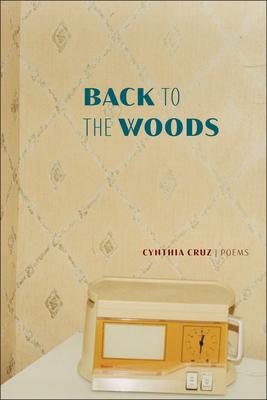National Book Critics Circle Award Winner Cynthia Cruz reevaluates the paradox of the death drive in her eighth collection of poetry, Back to the Woods. Could it be that in ceaselessly snuffing ourselves out we are, in fact, trying to survive? In "Shine," Cruz's speaker attests that "if [she] had a home, it would be // a still in a film / where the sound / got jammed." This book inhabits the silence of the empty orchestra pit, facing "dread, and its many / instruments of sorrow." The quiet asks, "Did you love this world / and did this world / not love you?" We return to the site of our suffering, we perform the symphony of all our old injuries, to master what has broken us. To make possible the future, we retreat into the past. "I don't know / the ending. // I don't know anything," our speaker insists, but she follows the wind's off-kilter song of "winter / in the pines" and "the dissonance / of siskins." Cruz heeds the urgency of our wandering, the mandate that we must get back to the woods, not simply for the forest to devour us -- she recognizes in the oblivion "flooding out / from its spiral branches" an impossible promise. At the tree line, we might vanish to begin again.

National Book Critics Circle Award Winner Cynthia Cruz reevaluates the paradox of the death drive in her eighth collection of poetry, Back to the Woods. Could it be that in ceaselessly snuffing ourselves out we are, in fact, trying to survive? In "Shine," Cruz's speaker attests that "if [she] had a home, it would be // a still in a film / where the sound / got jammed." This book inhabits the silence of the empty orchestra pit, facing "dread, and its many / instruments of sorrow." The quiet asks, "Did you love this world / and did this world / not love you?" We return to the site of our suffering, we perform the symphony of all our old injuries, to master what has broken us. To make possible the future, we retreat into the past. "I don't know / the ending. // I don't know anything," our speaker insists, but she follows the wind's off-kilter song of "winter / in the pines" and "the dissonance / of siskins." Cruz heeds the urgency of our wandering, the mandate that we must get back to the woods, not simply for the forest to devour us -- she recognizes in the oblivion "flooding out / from its spiral branches" an impossible promise. At the tree line, we might vanish to begin again.